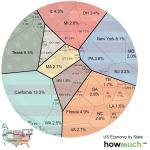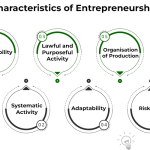Gina Raimondo’s leadership as the U.S. Secretary of Commerce has been marked by bold economic initiatives and a clear vision for America’s future. Under her guidance, the Biden administration has endeavored to strengthen the U.S. economy by addressing critical issues like national security chips and supply chain vulnerabilities. Raimondo’s approach emphasizes the necessity of change, even if it means dismantling outdated systems that hinder progress. With a strong background in public service, she champions fairness and opportunity, drawing from her immigrant roots and commitment to community-focused solutions. As America navigates a rapidly changing global landscape, Raimondo’s insights and decisions will play a pivotal role in shaping the nation’s economic resilience and competitiveness.
The leadership of Gina Raimondo, highlighted through her role as the U.S. Secretary of Commerce, showcases a transformative era in economic policymaking. By implementing innovative strategies and initiatives, she represents a forward-thinking approach within the Biden administration, aimed at enhancing America’s competitiveness on the global stage. Embracing change as a foundational principle, Raimondo is focused on revitalizing industries and ensuring the availability of essential supplies, particularly in relation to national security concerns surrounding advanced chips. Her ability to cultivate relationships both domestically and internationally establishes a robust framework for economic recovery and growth. Through her actions, she champions a vision where equitable opportunities prevail, resonating deeply with the values of her heritage.
Gina Raimondo’s Vision for Economic Balance
Gina Raimondo’s leadership as the U.S. Secretary of Commerce has been characterized by her pragmatic approach to economic initiatives that aim to balance growth with fairness. During her tenure, she emphasized that genuine progress requires breaking away from outdated practices and embracing reforms that can sometimes disrupt the status quo. Raimondo’s commitment to cutting taxes while raising the minimum wage illustrates her belief that economic policies must prioritize the well-being of citizens without compromising fiscal responsibility. This belief was embedded in her past role as Governor of Rhode Island, where she successfully implemented policies that laid the groundwork for a stronger economy.
Her focus on grassroots economic initiatives is rooted in her personal background as the granddaughter of immigrants, which shapes her understanding of the American Dream. Raimondo believes that opportunities for all Americans can only be achieved through comprehensive reform that includes investing in education and workforce development. For example, her efforts to make community college tuition-free were not merely about accessibility but about creating a workforce equipped to handle the complexities of today’s economy. This holistic view of economic development is reflective of her broader vision for America’s competitiveness in the global market.
Strengthening National Security Through Commerce
Under Gina Raimondo’s leadership, the Biden administration has placed a strong emphasis on national security through economic resilience. The CHIPs and Science Act, which aims to bolster domestic semiconductor production, is a clear reflection of this strategy. Raimondo has articulated that reliance on foreign manufacturing, particularly with critical components like AI chips, poses significant risks to national security. The urgency of developing a more self-sufficient supply chain has been heightened as the world grapples with geopolitical tensions, particularly with major entities like China that do not play by global trade rules.
Raimondo’s approach to national security is not just about safeguarding technology but also about ensuring that the U.S. maintains its position as a leader in innovation. The administration’s efforts to cultivate relationships in Southeast Asia under Raimondo’s direction signify a strategic shift towards collaborative partnerships that enhance both economic and security interests. This multifaceted strategy not only strengthens the U.S. economy but also ensures a robust response mechanism in face of external threats. Through proactive measures, Raimondo champions the idea that economic security is intrinsically linked to national security.
Addressing Supply Chain Challenges During COVID-19
The COVID-19 pandemic exposed glaring vulnerabilities in global supply chains, a challenge that Gina Raimondo confronted head-on during her time as Secretary of Commerce. Recognizing the significance of critical supply chains, particularly in pharmaceuticals, Raimondo spearheaded efforts to map out the complexities inherent in these networks. This detailed understanding was pivotal in responding to shortages and ensuring that essential products reached the American public during a time of crisis. Her proactive analysis led to the creation of comprehensive models designed to foresee potential disruptions and expedite recovery efforts.
In her discussions, Raimondo underscored the importance of building resilient supply chains that are less reliant on international sources, particularly from regions susceptible to political instability. By fostering relationships with countries like Indonesia and the Philippines, the Biden administration aimed to develop a more robust network that would mitigate the risks of future disruptions. The lessons learned from the pandemic are shaping policies toward a more self-reliant economic infrastructure, signaling a long-term commitment to ensuring American consumers are not left vulnerable in the face of global challenges.
Transformative Economic Policies Throughout Raimondo’s Career
Gina Raimondo’s impact on economic policy is evident in her strategic approach to governance, where transformative decisions have consistently centered around the welfare of ordinary Americans. From her tenure as Governor of Rhode Island to her role in the Biden administration, Raimondo has showcased a unique ability to implement policies that not only spur economic growth but also safeguard the interests of the working class. Her experiences reflect a deep understanding of the challenges faced by everyday citizens, and this empathy drives her policy-making process.
One prominent example of her transformative economic leadership is the coordination of the Infrastructure Investment and Jobs Act, which aimed to revitalize American infrastructure while creating jobs in the process. Raimondo’s push for labor market initiatives, including childcare provisions, demonstrates her recognition that economic success is intrinsically gendered and demands inclusive strategies. By ensuring that social programs work in tandem with economic initiatives, Raimondo reinforces the idea that successful policy should address the interconnected nature of society and the economy.
A Champion for Fair and Inclusive Opportunities
Throughout her political career, Gina Raimondo has been a staunch advocate for ensuring fair and inclusive opportunities for all Americans. This commitment stems from her own family’s immigrant background and experiences that highlighted the struggle for equitable access to the American Dream. Raimondo often speaks about her motivation to enter politics: the desire to make sure that all individuals have a chance to succeed, particularly as economic disparities continue to widen.
As Secretary of Commerce, Raimondo implemented policies focused on creating jobs that are not only accessible but also sustainable. By advocating for community college reforms and workforce training, she aimed to break down barriers that prevent disadvantaged groups, particularly women, from entering the labor market. Her awareness that businesses need a diverse workforce to thrive highlights her belief that economic initiatives must be equitable to be effective.
The Challenges of Legislative Progress in Today’s Political Climate
Gina Raimondo has faced her share of challenges in advancing economic initiatives in a politically divided landscape. Reflecting on her time in the Biden administration, she notes the inherent difficulties of achieving consensus in a 50-50 Senate and a narrow House majority. This reality requires compromise, often leading to criticisms from various quarters that some initiatives were diluted to secure bipartisan support. Raimondo’s willingness to engage in tough negotiations showcases her commitment to progress, even when it means making tough choices.
This complex political backdrop has made the execution of critical initiatives, such as the CHIPs Act, both vital and precarious. Raimondo balances the need to push forward ambitious economic strategies with the necessity of navigating a challenging legislative environment. Despite criticisms, she emphasizes the successes achieved under such constraints, asserting that tangible advancements like increased semiconductor production are milestones in protecting U.S. economic interests in the long term.
Learning from Past Mistakes and Moving Forward
Raimondo’s insights into past legislative efforts reveal her reflective nature as a leader in economic policy. She acknowledges that while some compromises were necessary, they may have been perceived as weaknesses by observers unaware of the complexities of governance. This aspect of her leadership underscores the reality that political progress often involves trade-offs, particularly in challenging economic climates. The lessons learned from past initiatives inform her current and future approaches to policy-making.
Moreover, Raimondo recognizes the critique of the Biden administration’s stimulus as a contributor to inflation. However, she emphasizes the critical need for the stimulus during the COVID-19 crisis, especially when millions were facing unemployment. By framing her decisions as rooted in immediate necessity rather than short-term political gain, she illustrates her commitment to protecting the livelihoods of ordinary citizens. Moving forward, Raimondo’s reflective stance may pave the way for more informed economic strategies that balance response to crises with fiscal prudence.
Building a Future-Focused Workforce
Under the leadership of Gina Raimondo, there is an inherent understanding that building a resilient economy starts with developing a future-focused workforce. In her policies, she advocates for education and vocational training programs that prepare Americans for the jobs of tomorrow, particularly in emerging technologies and green industries. This shift towards prioritizing skill-based training aligns with the Biden administration’s broader economic agenda, which aims to cultivate a workforce capable of competing in a rapidly changing global economy.
Raimondo has repeatedly stressed that businesses cannot succeed without a stable and skilled labor force. By advocating for integrated solutions like childcare assistance and employee benefits, she acknowledges the interconnectedness of economic stability and workforce inclusion. Such initiatives not only strengthen the labor market but also encourage diverse participation, helping to close the gender gap in employment and ensuring that economic recovery is equitable and sustainable.
Frequently Asked Questions
What are some key economic initiatives led by Gina Raimondo during her time as U.S. Secretary of Commerce?
During her tenure as U.S. Secretary of Commerce, Gina Raimondo spearheaded several key economic initiatives including the implementation of the CHIPs and Science Act, aimed at enhancing domestic semiconductor production for national security. She also focused on rebuilding critical supply chains disrupted by the COVID-19 pandemic, fostering international relationships to support these efforts.
How did Gina Raimondo’s leadership impact national security policies regarding semiconductor production?
Gina Raimondo’s leadership in the Biden administration prioritized national security through the advancement of domestic semiconductor production, as highlighted by the CHIPs and Science Act. By producing a quarter of the nation’s chips by 2030, Raimondo emphasized the connection between advanced chip manufacturing and national defense, addressing vulnerabilities exposed by relying on foreign production.
What strategies did Gina Raimondo employ to strengthen U.S. international economic relations as Secretary of Commerce?
To strengthen international economic relations, Gina Raimondo encouraged collaborative relationships with countries in Southeast Asia, such as Indonesia and the Philippines. This approach was part of a broader strategy to ensure the U.S. could effectively navigate global supply chain complexities amidst the challenges posed by the COVID-19 pandemic.
How did Gina Raimondo address the challenges of the COVID-19 pandemic as U.S. Secretary of Commerce?
Gina Raimondo tackled the challenges of the COVID-19 pandemic by developing intricate spreadsheets to map critical supply chains, such as pharmaceuticals. Her leadership involved identifying vulnerabilities and building partnerships with other nations to ensure a more resilient supply chain network.
What role did Gina Raimondo play in shaping the Infrastructure Investment and Jobs Act under the Biden administration?
Gina Raimondo played a crucial role in shaping the Infrastructure Investment and Jobs Act by advocating for investments that would bolster the American economy and create jobs. Her background as Governor of Rhode Island provided her with insight into the needs of states and localities, enabling her to align federal initiatives with on-the-ground realities.
What challenges did Gina Raimondo face while implementing economic policies as U.S. Secretary of Commerce?
Gina Raimondo faced significant challenges in implementing economic policies, notably the need to balance a divided Congress, which required navigating compromises while pushing forward initiatives like the CHIPs and Science Act. Additionally, she had to contend with public criticism over economic decisions during a politically charged atmosphere.
How does Gina Raimondo’s leadership philosophy reflect her personal background and experiences?
Gina Raimondo’s leadership philosophy is deeply rooted in her personal background as the granddaughter of immigrants, instilling a commitment to fairness and opportunity. Her early experiences of seeing the American Dream become less attainable motivated her to engage in politics, promoting policies aimed at improving the lives of everyday Americans.
What key lessons does Gina Raimondo emphasize regarding economic reforms and the impact on everyday Americans?
Gina Raimondo emphasizes that effective economic reforms often require bold changes, even if it means ‘breaking things.’ She advocates for policies that enhance worker opportunities, such as raising the minimum wage and ensuring affordable education, all while stressing the importance of not harming people in the process of making such changes.
| Key Points | Details |
|---|---|
| Positive Change Requires Disruption | Gina Raimondo emphasizes the need to sometimes ‘break things’ to foster improvement without harming people. |
| Tax Cuts and Wage Increases | As Governor of Rhode Island, Raimondo cut taxes, raised the minimum wage, and made community college tuition-free. |
| Regulatory Reductions | She managed to reduce state regulations by 30% during her tenure. |
| Focus on Fairness | Raimondo’s involvement in politics is rooted in her desire to help everyday Americans. |
| Strengthening Supply Chains | Raimondo’s work during the COVID crisis included creating spreadsheets for critical supply chains. |
| Global Relations under Biden | She helped cultivate relationships with Southeast Asian countries to strengthen supply chains. |
| Manufacturing Goals | Aiming for the U.S. to manufacture 25% of needed semiconductors by 2030. |
| Economic Responsibility | For every dollar invested in legislation, $10 in private-sector funding was achieved. |
| Addressing Challenges in Politics | Raimondo acknowledges compromises made during her time in the Biden administration. |
| Stimulus Response During COVID-19 | She justifies the scale of the stimulus act, emphasizing the need to support the unemployed. |
| Integration of Social Programs | Raimondo highlights the importance of childcare in attracting women to the workforce. |
Summary
Gina Raimondo’s leadership reflects a transformative approach to governance where making tough decisions can lead to substantial improvements for society. Her strategies, from reducing taxes and regulations to advocating for fair wages, showcase her commitment to ensuring that no one is left behind. Through her actions, she not only aims to enhance economic stability but also strives to build a more inclusive future where the American Dream remains attainable for all.







